The AMD Ryzen Threadripper 3960X and 3970X Review: 24 and 32 Cores on 7nm
by Dr. Ian Cutress, Andrei Frumusanu & Gavin Bonshor on November 25, 2019 9:05 AM ESTCPU Performance: Encoding Tests
With the rise of streaming, vlogs, and video content as a whole, encoding and transcoding tests are becoming ever more important. Not only are more home users and gamers needing to convert video files into something more manageable, for streaming or archival purposes, but the servers that manage the output also manage around data and log files with compression and decompression. Our encoding tasks are focused around these important scenarios, with input from the community for the best implementation of real-world testing.
All of our benchmark results can also be found in our benchmark engine, Bench.
Handbrake 1.1.0: Streaming and Archival Video Transcoding
A popular open source tool, Handbrake is the anything-to-anything video conversion software that a number of people use as a reference point. The danger is always on version numbers and optimization, for example the latest versions of the software can take advantage of AVX-512 and OpenCL to accelerate certain types of transcoding and algorithms. The version we use here is a pure CPU play, with common transcoding variations.
We have split Handbrake up into several tests, using a Logitech C920 1080p60 native webcam recording (essentially a streamer recording), and convert them into two types of streaming formats and one for archival. The output settings used are:
- 720p60 at 6000 kbps constant bit rate, fast setting, high profile
- 1080p60 at 3500 kbps constant bit rate, faster setting, main profile
- 1080p60 HEVC at 3500 kbps variable bit rate, fast setting, main profile
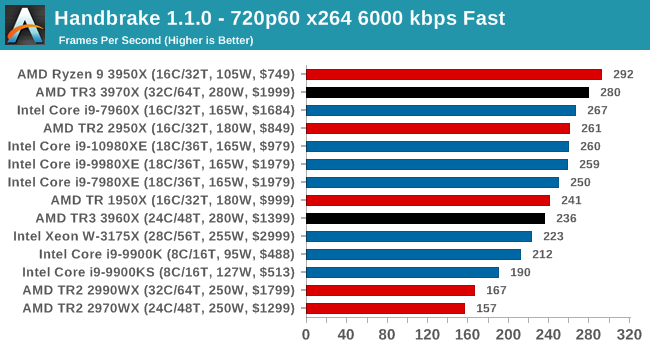
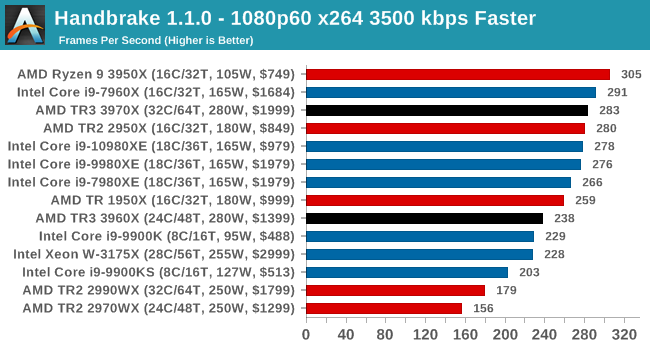
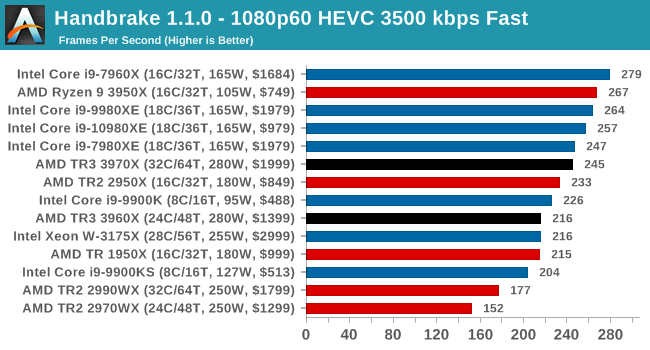
Video encoding is a little varied, based on the variable threaded nature. Certain encoding tests can be more memory sensitive here, or accelerated in different ways, or not scale well with more cores. Either way, TR3 performs a lot better than TR2, but the 3950X seems the best choice.
7-zip v1805: Popular Open-Source Encoding Engine
Out of our compression/decompression tool tests, 7-zip is the most requested and comes with a built-in benchmark. For our test suite, we’ve pulled the latest version of the software and we run the benchmark from the command line, reporting the compression, decompression, and a combined score.
It is noted in this benchmark that the latest multi-die processors have very bi-modal performance between compression and decompression, performing well in one and badly in the other. There are also discussions around how the Windows Scheduler is implementing every thread. As we get more results, it will be interesting to see how this plays out.
Please note, if you plan to share out the Compression graph, please include the Decompression one. Otherwise you’re only presenting half a picture.
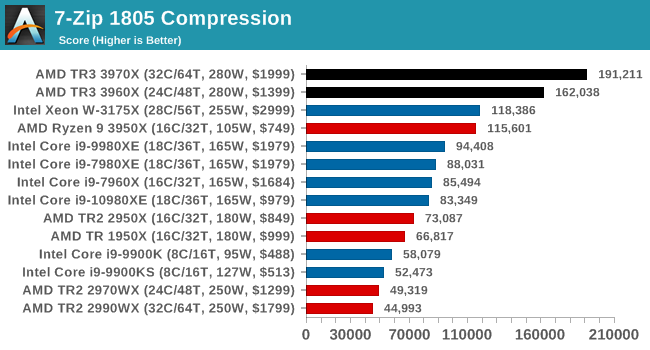
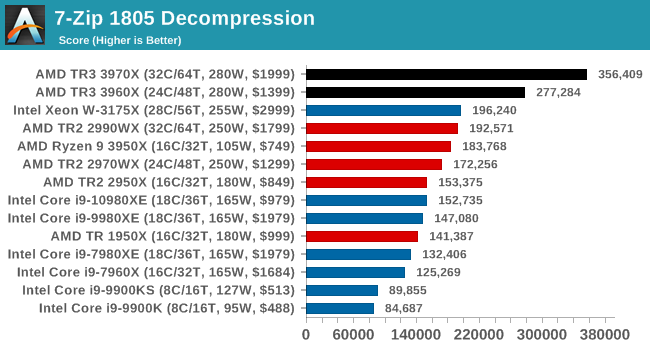
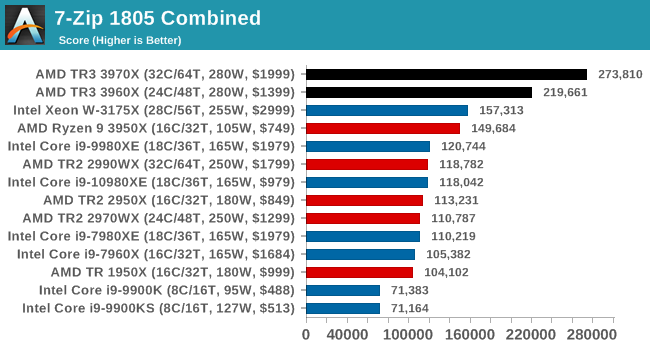
Easily parallel puts the TR3 well ahead of TR2 and Intel.
WinRAR 5.60b3: Archiving Tool
My compression tool of choice is often WinRAR, having been one of the first tools a number of my generation used over two decades ago. The interface has not changed much, although the integration with Windows right click commands is always a plus. It has no in-built test, so we run a compression over a set directory containing over thirty 60-second video files and 2000 small web-based files at a normal compression rate.
WinRAR is variable threaded but also susceptible to caching, so in our test we run it 10 times and take the average of the last five, leaving the test purely for raw CPU compute performance.
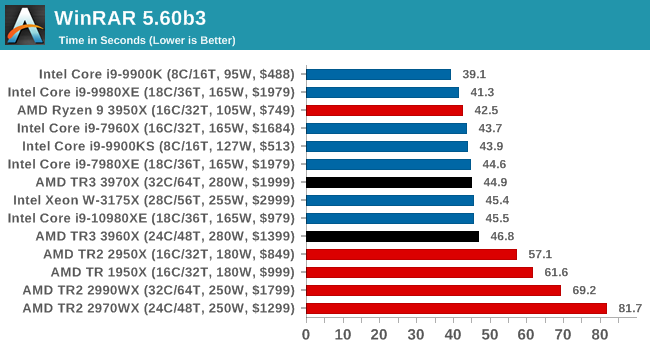
WinRAR is a variably threaded application, and both TR3 processors perform in the same ballpark as anything from Intel. Ideally we should have seen them streak ahead, but we seem to be at a point where CPU frequency or core counts are the limiting factor. At least with Zen 2, there are no issues as there was with Zen 1/Zen+.
AES Encryption: File Security
A number of platforms, particularly mobile devices, are now offering encryption by default with file systems in order to protect the contents. Windows based devices have these options as well, often applied by BitLocker or third-party software. In our AES encryption test, we used the discontinued TrueCrypt for its built-in benchmark, which tests several encryption algorithms directly in memory.
The data we take for this test is the combined AES encrypt/decrypt performance, measured in gigabytes per second. The software does use AES commands for processors that offer hardware selection, however not AVX-512.
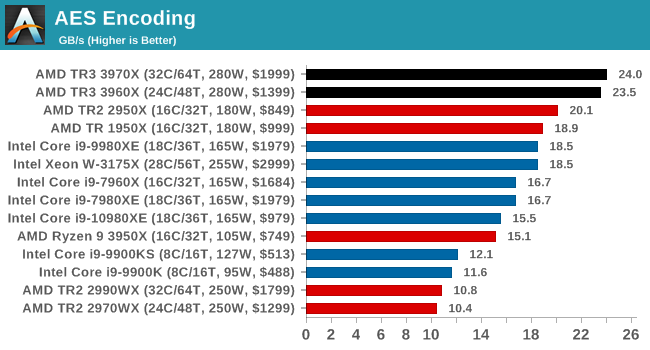










245 Comments
View All Comments
zky1 - Monday, November 25, 2019 - link
Too expensive. Anything over $300 for a cpu is a ripoff. See you in two years when these threadrippers are obsolete.peevee - Monday, November 25, 2019 - link
Very likely it is a new plateau enabled by 7nm and brand new Zen architecture developed to its potential. I predict small improvements from here for the next several years as it has been with Intel since Sandy Bridge - only better AVX512 implementation on something like 5nm and DDR5 will bring some improvements, but don't expect wonders on most tasks which don't care about memory throughput or AVX512.Slash3 - Tuesday, November 26, 2019 - link
The upcoming Zen 3 architecture revision is reported to provide up to a ~10% IPC uplift, with some neat tricks such as unifying the L3 cache per chiplet (no more CCX contention).There's always something better around the corner. :)
lobz - Tuesday, November 26, 2019 - link
Nope, it's the CCX size that changes from 4 to 8 cores.peevee - Tuesday, November 26, 2019 - link
"Up to 10%" - exactly what I have meant, a plateau, like Intel had after Sandy Bridge, adding only ~5% each year...Korguz - Tuesday, November 26, 2019 - link
peevee um intel could of improved their ipc more each year.. but they didnt, there was no reason too.. just like they could of given mainstream more then 4 cores.. but they didnt as well.. mostly because of zen.. is there more then 4 cores from intel..catheryn75 - Monday, November 25, 2019 - link
It's too bad they aren't available anywhere other then a few system builders. ie CyberPower , Origin , and others.Some of us who would use one of these new processors dont want to pay the extra 1500-2k for someone else to build it when we could do it ourselves.
AMD was really short sighted not at least having some supply at Newegg, Microcenter, Fry's, etc.. on launch day.
Dug - Monday, November 25, 2019 - link
That's a lot of power needed for 24 cores. 3960 at 280w. And it's recommended to get water cooling? They aren't going to get many buyers on that.6 more cores than Intel 10980, but needs 90w more power to get there.
I thought 7nm would be better than this.
The Xeon is way out of wack at 381.
People that really need the speed to save in man hour costs, expect a high end system with warranty, instant replacement, compatibility (especially vm), and reliability. I don't think you are going to get that with water cooling. And I don't see any major players that offer what I listed, going to a water cooled system anytime soon.
alufan - Tuesday, November 26, 2019 - link
https://www.scan.co.uk/3xs/configurator/amd-thread...pricey though but its liquid cooled
Dug - Tuesday, November 26, 2019 - link
Not exactly mainstream. I'm talking Dell, HP